Virtualis and Regeneration
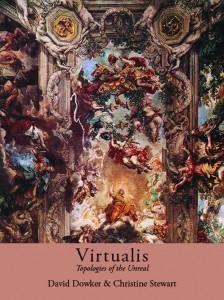 Virtualis: Topologies of the Unreal
Virtualis: Topologies of the Unreal
by David Dowker & Christine Stewart
BookThug, 2013
81 pages / $18 Buy from Amazon or SPD
I. “We are gathering interior circumference.”
“No longer a phantasm and not yet a sign, the unreal object of melancholy introjection opens a space that is neither the hallucinated oneiric scene of the phantasms nor the indifferent world of natural objects…. The topology of the unreal that melancholy designs in its immobile dialectic is, at the same time, a topology of culture.” – Giorgio Agamben, Stanzas: Word and Phantasm in Western Culture
Virtualis is a dense and lyrical book mediated by visionary and philosophical language, commemorating “the vibratory distances between dreams.” Dowker and Stewart use exquisitely ornamental language to exalt the majesty of the senses in poems I found to be radically potent. This book weaves a kind of lexical magic as threads of stunning lyricism and metaphysical fantasia so vibrant it feels like a synesthetic dream. These poems appear as phantasms from the depths of the imaginal – bridging philosophy, musical language, at once odd and angular yet exquisitely crafted, like Brancusi’s Bird in Space. This book includes a reading list of philosophy books that are quoted, including works by Agamben, Deleuze, Benjamin and others.
Virtualis functions as a voyage into pure consciousness. The text’s mindfulness is a rich ore of ekphrastic palingenesis. The mix of some pretty heady philosophical language with soaring lyrical fantasia is something I find totally stimulating: “Our vocabularies maintain subjective principles not immediately apparent as the (inexplicable) lure of verdure.” The book’s philosophical language gives weight to its ethereal fantasia, grounding the book’s assemblage point in a preternatural realm of euphoric convergence weighted in the shells of some spectral egg, creating layers upon layers through which these poems can be enjoyed.
“Genus is dissolute. Vagrant is its range. It is the logical effluvium of some proto-binomial urge. Brute geogeny overwhelms ontology. Basic array of itinerant fragrance and mute fruition.
Spaces are their own bloom. A gauge of any and several congenital avowals. This rate brain interpretation lichen aligned phosphorous chorus to appall us (o rhodopsin bop voluptuary).
To divulge is lysergic (time-section light-thought in lilt). It is febrile nostalgia. Rapt state. Atavistic splendour of that chymical epoch.
There are silences, mania . . . convalescence.
Distractions avalanche here. See selah –– a shapely cadence. The converted word installed in perfect retrograde.”
This is pretty ethereal stuff, and these abstractions generate a vortex of ideation that moves me as a reader into a realm of ideas for which there are no words. Imaginal texts can lure us to a state of the royal art, Raja-Yoga, where the mind is a kind of kaleidoscope fluctuating between realities all condensed into a multilayered assemblage.
Virtualis is a confluence of worlds in the sense that this book is a meeting place of ideas, of forms, of Beauty. The condensation of vertical space here is so utterly ripe with alchemical gold, forever “in the process of disassembling the semblance / of an open space.” Virtualis exemplifies the rajasic qualities of energy, movement, generation and animation. These are poems of “a mostly ghostly trace” that move through a luminous realm of alternative perceptions toward an aphasic state devoid of all mediocrity and ugliness. Its singular bravado is a daring exploration of sonic beauty and the integrated psyche. I commend the authors for their generosity of vision, and for willing to look “along the fringes of consciousness.”
December 6th, 2013 / 12:00 pm
STRANGE INTRUDERS
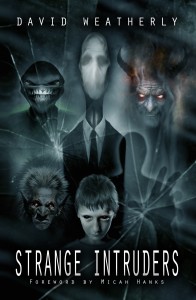 Strange Intruders
Strange Intruders
by David Weatherly
Leprechaun Press, August 2013
173 pages / $16 Buy from Leprechaun Press
I was initially hesitant to read this book and write this review. To even acknowledge the presence of these ulterior intelligent forces, to name them and to give them recognition is to give them energy through the concentrated power of belief. Belief has the power to move mountains, to create and destroy empires. Belief in these nightmarish boogeymen acts as an invitation to them, to allow them to infiltrate the psyche in some subtle way. Weatherly writes, “Traditional lore says that speaking about the djinn too much, or too loudly, will attract their attention and cause them to trouble you. They often take their time, lurking about and learning as much as they can about a person to decide how best to take advantage.” On this note, I encourage readers to explore this material with caution.
David Weatherly’s Strange Intruders is a chilling look at the ulterior intelligent forces that manifest as strange entities that have been encountered all over the world. Weatherly specifically examines black-eyed beings, Djinn, shadow people, the Grinning Man, Pukwudgies, shapeshifters, the Slenderman, and other nightmarish entities that come from the periphery. Weatherly focuses on these lesser-known entities that continue to unsettle, and Strange Intruders is revelatory simply because there is scant literature out there on many of these beings. Weatherly examines this rogues gallery of nightmarish entities as well as “the strange nonhuman presence” that accompanies these encounters.
Weatherly’s previous book, last year’s The Black Eyed Children, has already become something of a minor classic in the field of high strangeness. Although Strange Intruders contains a handful of new encounters with black-eyed entities, it broadens his scope to include a variety of entity encounters, sort of like an updated version of The Complete Guide to Mysterious Beings by John A. Keel but with a focus on humanoid entities and the disturbing intelligent forces that hide in a human-like form. Weatherly’s clunky prose and occasional grammatical errors are mostly excusable because serious literature on these entities is hard to come by. These accounts are unsettling at a primal level.
One highlight of Strange Intruders is the chapter on the Grinning Man, a tall, thin and oddly dressed man with a freakishly exaggerated grin on his face. Weatherly claims to have encountered the Grinning Man in the late 80s and his experience recounted here is as bizarre and unsettling as any.
One of my favorite parts of the book was the chapter on shadow people. The shadow people have been described as “a mist of black energy” and “humanoid forms that appear to be made of pure darkness.” The shadow people have been the subject of many excellent episodes of Art Bell’s Coast to Coast AM. Weatherly writes, “Another intriguing theory proposes that the shadow beings are actually the manifestation of pure thought or negative energy. Like the classic Tulpa of Tibetan lore, these beings are a creation of concentrated energy, taking physical form and attempting to ‘feed’ on the energy of fear and dread that they invoke in their victims. These types of beings can eventually take on solid, physical form once they have taken a sufficient amount of energy.”
This theory cleverly modifies a famous belief of Keel’s. Instead of the planet itself being haunted, it is the human psyche that is being haunted. The psyche is fragmented every night through sleep and through dream. When we wake in the morning we often have little or no recollection or what happens in the sleep state. In sleep and dreams we may become vulnerable to these ulterior intelligent forces to infiltrate our intelligence, often in the subtlest ways. Weatherly’s next book is supposedly about Tulpas and thought-forms, and I’d be very interested to see him elaborate on this intriguing theory.
However, there is no one theory that adequately explains the existence of all these nightmarish entities, and the unknowable nature of this phenomenon adds to its unsettling nature. In a terrifying chapter entitled “Hiding in Human Form,” Weatherly examines cases where disturbing entities appear as humans who shape-shift into sinister black-eyed beings and other disturbing manifestations. This is reminiscent of Keel’s disturbing look at ‘artificial humans’ and other odd humanoids in The Mothman Prophecies.
October 31st, 2013 / 11:00 am
Our Prime Vibratory Antennae: A Conversation with Will Alexander
 Will Alexander is a visionary and ecstatic writer whose most recent book is Singing in Magnetic Hoofbeat: Essays, Prose Texts, Interviews and a Lecture, published by Essay Press. Other recent books include Kaleidoscopic Omniscience, Mirach Speaks to His Grammatical Transparents, Inside the Earthquake Palace and Compression & Purity.
Will Alexander is a visionary and ecstatic writer whose most recent book is Singing in Magnetic Hoofbeat: Essays, Prose Texts, Interviews and a Lecture, published by Essay Press. Other recent books include Kaleidoscopic Omniscience, Mirach Speaks to His Grammatical Transparents, Inside the Earthquake Palace and Compression & Purity.
Alexander writes in “Spirit and Practice,” an essay from Singing in Magnetic Hoofbeat, “Being menaced by consciousness, the poet finds that the magnetic inscription of words on the page is only part of a continuum. One’s every movement, one’s every despair, is empowered by a wild illuminant rush which burns at the base of one’s character. This is the praxis of spiritus, the praxis of breath, in the simultaneous realms of the diurnal and the oneiric. This constant awareness seems always empowered by a surreptitious sun emitting its power through the aural canals. And the raw material of life is always transmuted by these aural rays. And because of the fire at this sensitive level, one is continuously placed in temperamental combat against the quotidian carnivore, against its reflexive muscle of fact.”
Alexander’s prolific body of work radiates radiance and exemplifies a type of luminosity that seems extremely rare in this world. His verbal flights soar far above the quotidian to a place of vision. Alexander’s use of language is alchemical and talismanic, relating to mental travel through the expansion of awareness and the unfolding of alternate modes of perception. I’d like to thank Will Alexander for providing a way to see, a way to facilitate the envelopment of energy, and for engaging me in this discussion.
***
Chris Moran: Your writing often takes me to remote sectors of the psyche where the language of poetry is not the exception but the primary ruling principle. This has something to do with your expansive vocabulary, which often incorporates the language of astronomy, geology, mathematics, alchemy, botany, mythology, geography, and many other fields. Your use of language goes far beyond the ‘neuro-linguistic programming’ that can stifle the imagination. It feels akin to scrying, and I sense there is something deeply alchemical going on. How is this lens of perception attained, where poetry is indistinguishable from philosophy? Also, do you see language as divinatory?
Will Alexander: When language is felt as a living intelligence it quickens as one internally develops. One can feel its spontaneity like a drone in one’s system. For me, it magnetizes itself to different genres, and to various branches of knowledge. All knowledge springs from the 26 letters of the alphabet, being a poet I am naturally magnetized to its spectrum. Being free, I can range across its field of expression, which includes medicine, astronomy, botany, history, music, cinema, mysticism, architecture. It’s an infinite and evolving list. I’m picking up murmurs all the time. In this sense as I write language takes on an alchemic personality, like an Amazonian flooding replete with the ferocity and power of aboriginal presence. A power yes, but not unlike the mathematics which the old Kemetians used in constructing the pyramids. A living word is not unlike a living number creating a pulsing construct, be it a piece of writing or a pyramid. In this sense creative language is not adverse to philosophical utterance of the vatic.
CM: It’s not unusual to come across words in your poems that I’m unfamiliar with, and many of your books feature a glossary. What you do reminds me of Hart Crane’s dictum to “create new words, never before spoken and impossible to actually enunciate.” This goes far beyond the saturation of elemental forces, as it incorporates planetary and cosmic energy. Where does this knowledge come from? Is it necessary to access alternate modes of perception in order for poetry to process knowledge, or for a poet to embody knowledge? How do you attain this multidimensional framework?

WA: I’ve been engaged in a praxis sustained across duration. I’ll call it in this context poetic yoga. I remain in poetic trance day and night. It is a living world. As I stated earlier the poetic is always murmuring to such an extent that I feel its palpable presence within me. It is a presence which was first introduced to me when I learned about circular breathing. When one can breathe through one’s medium to such a degree that quotidian distraction can gain no entry. One then embodies whatever one is writing on to such a degree that the specific nature of the subject at hand ignites from the root being engaged by the imagination takes on the tenor of the unexpected. The unexpected charged with magnetism which naturally attracts energies from what the Occidental mind calls the invisible. And it is by means of this invisibility that one can intermingle knowledges and poetically contact new lingual dimensions which ignite new synapse firings in the cortex, which can’t be predicted in an a-priori manner since organic creation carries spontaneous warmth as its resonance and by its very nature cannot be chronicled as one would abstractly add or transpose a superimposed structure replete with in-built boundary.
MOUTH OF HELL: Infernal Visions at the Edge of Consciousness
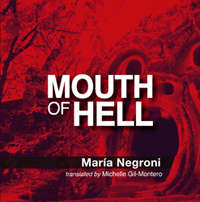 Mouth of Hell
Mouth of Hell
by María Negroni
Translated by Michelle Gil-Montero
Action Books, April 2013
112 pages / $16 Buy from Action Books or SPD
“So dark and deep and nebulous it was,
try as I might to force my sight below,
I could not see the shape of anything.” –– Dante, Inferno, Canto IV
“Then existence was a must, and I remain unborn. I’ve traveled with ghosts, or worse, drudged through discontent, destroying what I desired, which didn’t exist. Awkward to thrive as humanity atrophies, only to shelter in a garden of stones. And yet, in all that dismal jubilance, something sings: the soul, a tiny light that sounds among great monsters, growing always more equal to itself, thirstier for white words.” –– María Negroni, Mouth of Hell
***
Mouth of Hell is inspired by Manuel Mujica-Lainez’s Bomarzo, a novel I’ve never read, which itself is based on the eccentric Duke Pier Francesco Orsini, a 16th century nobleman who commissioned a sacred garden of monsters to be built in his honor. Negroni’s Mouth of Hell is composed of brief untitled prose poems, the proclamations of the decadent aesthete Orsini at the exact point of his death, which occurs inside the garden’s hellish grotto. These poems act as jolts of energy and are the culmination of a peculiar life as seen from the edge of consciousness.
Jorge Monteleone’s superb introduction and the translator’s preface do excellent service to shed some light on the historical Duke Orsini as well as the novel Bomarzo. This convergence of sources and voices sort of mirrors the fragmentation and reconstitution of selfhood that occurs in these poems, all happening in the heightened reality of the monstrous sculpture garden, “my biography and my park of monsters, who I’ve despised, envied, admired, and loved, deep down, terribly.” Speaking of the park’s sculptures, Orsini said, “Each rock represented an enchanted figure, in my memory or imagination.” Each poem in Mouth of Hell could do the same, creating a fascinating interplay of life, art, creation, dissolution, and rejuvenation of the senses.
“A lot could be said of my hideout. It is here where I ruminate and write, where I wield my inhuman right to dissent. Deep in the light, I draw my self-portrait: the high signs of a fearsome counterdance. Here, I play at life. Nestled like a hoard of jewels, I even possess what I’ve denied myself. In a word, I play with death. My den is motionless. Like the world, an untouchable relic within.”
Mouth of Hell, in part, chronicles a human soul gaining knowledge of itself upon death. These are finely tuned revelations of deranged nobility, commemorating “a lascivious earth to an uncertain beyond, the thread of my hallucinated life.” These are memories, sensations, fantasies, and proclamations of “the body whirling into conviction” at the brink of death. For this reason it occasionally feels like a radically condensed take on Dante’s Inferno.
“The forest dark as ever, without latitudes. An aide-de-camp to say something about nothing and guide us up the river of blood. As if there were cover under human tabula. Things strewn here and here, for worse and better. And later, in the middle of the road, the end of the endless, an immense door, passable and impassable, like the glacial spaces of the soul.”
Orsini’s garden of monsters remains after hundreds of years a singular artistic oddity. Monteleone informs us that above the crude demonic mouth is the inscription, “Lasciate ogni pensiero voi ch’entrate,” which can be translated, “Abandon all thought ye who enter.” This curious variation on Dante’s famous line suggests a total annihilation of the personal self. A journey into the underworld is nothing less than a chance to merge with the archetypal, with the infinite formless monsters of the abyss.
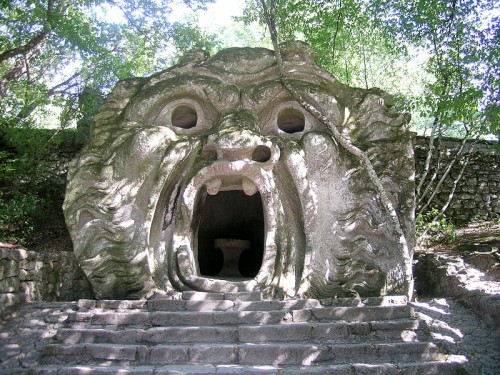
The sculpture garden, “the estate of the sensual,” is a monument of excess, and the demonic face that graces the cover of this book is as comically grotesque as any of Iron Maiden’s album covers. The opening of the mouth serves as a meeting place of two worlds. Just as death is the edge of life, the brink of the abyss is the edge of the visible.
August 26th, 2013 / 11:05 am
ANTIPHONAL AIRS
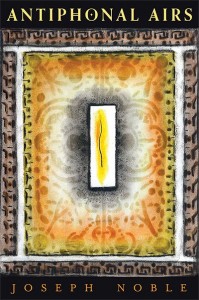 Antiphonal Airs
Antiphonal Airs
by Joseph Noble
Skylight Press, 2013
124 pages / $15.99 Buy from Skylight Press or Amazon
“What is wonderful about music is that it helps man to concentrate or meditate independently of thought. Therefore music seems to be the bridge over the gulf between the form and the formless. If there is anything intelligent, effective, and at the same time formless, it is music.” — Hazrat Inayat Khan, “Spiritual Attainment by the Aid of Music”
“One must side with Brahms or with the sun.” — E.M. Cioran, All Gall Is Divided
Antiphonal Airs interacts with the musical vibration of “transforming what is unseen into what is heard / what is unheard into what is imagined.” These grandiloquent gestures soar through entirely agreeable intonations, creating an excellent sensory experience. Here the music of poetry is refracted through early Italian Baroque music. Noble explores little-known yet magnificent composers, such as Nicola Matteis, Marco Uccellini, Giovanni Legrenzi, and Sigismondo D’India, to name just a few. As a classical music lover, this is pure delight.
On the similarities between poetry and music, Noble writes, “they both use sound, both take place in time, both seem to move with a fluidity of association at times, both have a sensual dimension to them, both can be an outcry or a whisper and everything between, are articulations of vibrating air, and both are avenues of enlightenment.” Antiphonal Airs is full of rich and vibrant poems, their lyrical nature echoing and reflecting the work of master composers.
air forgets its name
(water upon the sun)a fever fingers syllables
(ink spilling its reins)
uccellino,
harp in the street
(who turns the sun?)
song wheel in the iris
(swallow dilating sleep)
uccellino,
river flings itself into its reflection
(drum collides with the wind)
air is shaping the ear
(map on the tympanum)
uccellino,
angel climbs through the arm
(which finch in the ankle?)”
August 16th, 2013 / 11:00 am
fuckscapes by Sean Kilpatrick
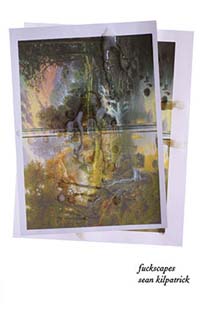 fuckscapes
fuckscapes
by Sean Kilpatrick
Blue Square Press, 2011
85 pages / $12 Buy from Blue Square Press
“O you cancer victims, O you hemorrhoid sufferers, O you multiple sclerotics, O you syphilitics, O you cardiac conditions, O you paraplegics, O you catatonics, O you schizoids, O you paranoids, O you hypochondriacs, O you carriers of causes of death, O you suicide candidates, O you potential peacetime casualties, O you potential war dead, O you potential accident victims, O you potential increase in the mortality rate, O you potential dead.” – Peter Handke, Offending the Audience
Reading Sean Kilpatrick’s first full-length poetry book fuckscapes is an experience that brings to mind Hart Crane’s dictum to create “a new word, never before spoken and impossible to actually enunciate.” Sean Kilpatrick’s poetry gives me that feeling. It is the feeling of a new language. Of expression so impossible I can barely begin to put into words how it makes me feel. But I can tremble before it. This book is insane and suggestive. Its brashness smolders like a confluence of spirit. He says, “bitch I doggy paddle the stars,” and “motherfucker my stains dance.” No thought is too outrageous, no obscenity unspoken. “Did you get your hysterectomy at Toys R Us?” This is not just poetry with an edge – no, it is beyond all edges, from the other side of the abyss, like gazing into an obsidian mirror at your non-human self.
a carbon monoxide ballroom
dreaming public toilets in Sicily
I am the pauper of glows
fraught with bow wow
I am the furnace of every disorder
Saying Christ inside a toy”
What makes Kilpatrick’s poetry really outrageous is its annihilation of meaning. This is nothing new, but under Kilpatrick’s eye it is totally alive, and puts shame to the “half-assed English majors” and other beholders of vision. In lines like, “time for sanitarium gods to moisturize the day,” it’s like he’s sabotaging the nature of expression. Words like ‘absurd’ and ‘surreal’ come to mind, but they are historical commodities, and in no way adequately describe the wild violence Kilpatrick demonstrates.
December 14th, 2012 / 12:00 pm
On Elegance While Sleeping
 On Elegance While Sleeping
On Elegance While Sleeping
by Viscount Lascano Tegui
Dalkey Archive, 2010
174 pages / $13.95 Buy from Dalkey Archive or Amazon
On Elegance While Sleeping is a decadent and deranged Argentinean novel, first published in 1922 and spanning four years in the life of an aesthete whose fluid diary entries function as a recollection of dreams, memories, visions, sexual fantasies, mundane observations, musings on death and the animal kingdom. These vignettes have the cumulative effect of a fractured psyche indulging in its own incompleteness. Sinister and surreal, each locution is touched by the flavor of elegance. It is a fantastic and dark marvel of a libertine’s fractured psyche, a damaged consciousness. Tegui’s novel feels like a spiritual cousin to Pessoa’s The Book of Disquiet and Rilke’s The Notebooks of Malte Laurids Brigge, these short and intensely interior novels deal in the anguish and ecstasy of poetry and isolation. Tegui writes, “Novelists overplay their hands when they put an end to their characters with some catastrophe—a terrible fire, a murder, what have you. They don’t trust in the asphyxiating monotony of everyday life.” But this novel has a darkness and subversive element that extends beyond sheer idleness, making it feel like the Argentinean counterpart to such subversive decadent classics as Maldoror, Aurélia, and A Rebours.
May 28th, 2012 / 12:00 pm
Everything Beyond Thought: Tantra Bensko and the Annihilation of Illusion
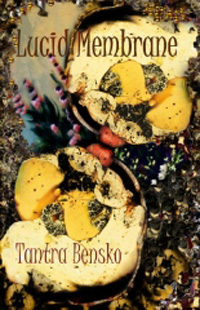 Lucid Membrane
Lucid Membrane
by Tantra Bensko
Night Publishing, 2011
180 pages / $24.99 Buy from Amazon
The Cabinet of What You Don’t See
by Tantra Bensko
ISMs Press, 2011
40 pages / $5.00 Buy from ISMs Press
“Awake from dream, the truth is known: —awake from waking, the Truth is—The Unknown.” – Aleister Crowley, The Book of Lies
In the delicate balance of dream and reality lies the annihilation of illusion. Tantra Bensko’s sensual unveiling relates to the intelligence of crystals. She is adept at the unknown: dreams, twilight language where thought relates to the imaginal, emblematic of the seer’s paranoid awareness and lucid view. The lucid aesthetic is kaleidoscopic and freewheeling in its engagement with metaphysical realities that extend far beyond the realm of fiction and delve into the heart of energy, and the imagination itself. Cosmic and personal, the molecular weight of the hermetic text manifests itself through capricious and fanciful dreams through Bensko’s steady and remarkable vision. These stories are inextricably tied to alternate dimensions and mental travel, skirting at the edges of the astral plane, and Bensko desires the astral form here—in life, so that great fruits may come. Bensko writes, “I wish the people I’m living with, on my own invisible frequency, could understand that I am weaving myself through their cells, through their dreams, their breath, their love.” It is with sweetness and an alien lucidity that these stories exist. Like the labyrinthine explorations of Borges—echoes from the invisible drift into the unaware oceans with mysterious interpretations of shape and tone, stained with colored language. In Bensko’s stories ethereal waves skim over the astral surface between the world’s heart and all that bleeds. Emanations of some imperceptible astral dust covers all things, in the shimmering shadows of formless force – giving it shape, with lucidity and spirit. Like shadows – like a mirror – space, sound and color interact and create a dynamic that denies any nostalgia for conventional structures through a manifestation of the unseen.
January 30th, 2012 / 12:00 pm
Diary As Sin by Will Alexander
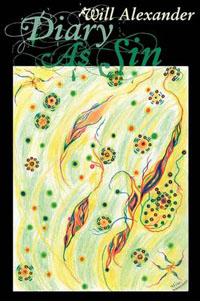 Diary As Sin
Diary As Sin
by Will Alexander
Skylight Press, 2011
172 pages / $18 Buy from Amazon
I. RAINBOW VORTEX OF THE ANIMATED BREATH
The Ancients, who believed in their dreams, believed in the meaning of their dreams, they did not believe in the forms they took. Behind their dreams and at varying levels, the Ancients sensed forces, and they immersed themselves in these forces. They had an overpowering sense of the presence of these forces, and they sought throughout their entire organism, if necessary by means of a real vertigo, the means of remaining in contact with the release of these forces.
– Antonin Artaud, “Man Against Destiny”
I think of myself, the poet sending signals into mystery, and having them return to me with oneiric wings and spirals, so much so, that I forget my prosaic locale with its stultifying anchors, with its familial dotage and image reports, with its dates inscribed in trapezoidal feces. I am only concerned with simultaneity and height, with rays of monomial kindling, guiding the neo-cortex through ravens, into the ecstasy of x-rays and blackness.
– Will Alexander, “On Anti-Biography”
READ MORE >
September 23rd, 2011 / 12:00 pm
Rays of Creation: Sunshine in the Valley by Kyle Muntz
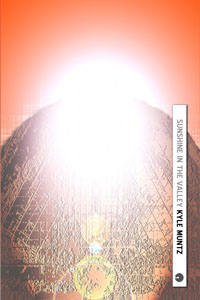 Sunshine in the Valley
Sunshine in the Valley
by Kyle Muntz
Civil Coping Mechanisms, 2010
222 pages / $14 Buy from Amazon
Through its ecstatic sweep and baroque grandeur, Sunshine in the Valley by Kyle Muntz espouses rays of creation that both illuminate and transfigure the atmosphere. It has an ethereal quality of infinite expansion, with a poetic opulence relating to a kind of freedom without a hint of anxiety or any inhibition. The feeling is like embracing the sky in fullest light – a celestial glow imparting splendor bathed in Uranian auras of mystery and rapture. Gazing through this diamond prism is a true delight.
September 5th, 2011 / 12:00 pm
